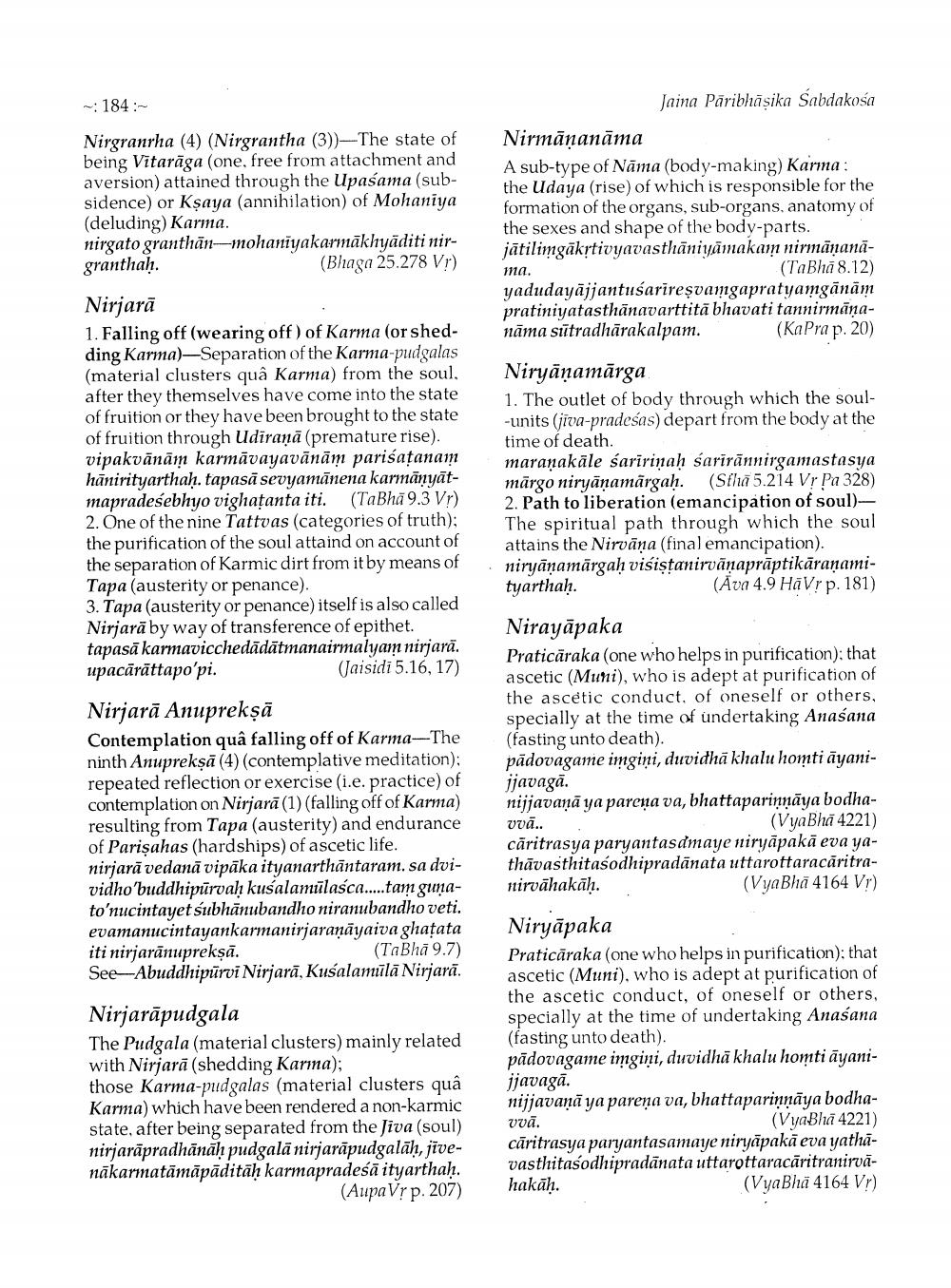________________
- 184:
Jaina Pāribhāsika Sabdakosa
Nirgranrha (4) (Nirgrantha (3))--The state of being Vitarāga (one, free from attachment and aversion) attained through the Upasama (subsidence) or Kşaya (annihilation) of Mohaniya (deluding) Karma. nirgato granthān--mohaniyakarmākhyāditi nirgranthah.
(Bhaga 25.278 Vr)
Nirmānanāma A sub-type of Nāma (body-making) Karma : the Udaya (rise) of which is responsible for the formation of the organs, sub-organs, anatomy of the sexes and shape of the body-parts. jātilimgākytivyavasthāniyāmakain nirmānana
(Ta Bhă 8.12) yadudayājjantuśarireşvamgapratyamgānām pratiniyatasthānavarttitā bhavati tannirmāņanāma sutradhārakalpam. (KaPra p. 20)
ma.
Nirjarā 1. Falling off (wearing off ) of Karma (or shedding Karma)—Separation of the Karma-pudgalas (material clusters quâ Karma) from the soul. after they themselves have come into the state of fruition or they have been brought to the state of fruition through Udiraņā (premature rise). vipakvānām karmāvayavānām parisatanam hānirityarthaḥ, tapasā sevyamānena karmānyātmapradeśebhyo vighatanta iti. (TaBhä 9.3 Vr) 2. One of the nine Tattvas (categories of truth); the purification of the soul attaind on account of the separation of Karmic dirt from it by means of Tapa (austerity or penance). 3. Tapa (austerity or penance) itself is also called Nirjarä by way of transference of epithet. tapasā karmavicchedādātmanairmalyam nirjara. upacārāttapo'pi.
(Jaisidi 5.16, 17)
Niryānamārga 1. The outlet of body through which the soul-units (jiva-pradesas) depart from the body at the time of death. maranakāle saririnah sarirānnirgamastasya mārgo niryānamārgah. (Sthā 5.214 Vr Pa 328) 2. Path to liberation (emancipation of soul)The spiritual path through which the soul attains the Nirvana (final emancipation). niryāṇamärgah višiştanirvāņaprāptikāraṇamityarthaḥ.
(Āva 4.9 HaVrp. 181)
Nirjarā Anuprekṣā Contemplation quâ falling off of Karma-The ninth Anuprekşā (4) (contemplative meditation); repeated reflection or exercise (i.e. practice) of contemplation on Nirjarā (1) (falling off of Karma resulting from Tapa (austerity) and endurance of Parişahas (hardships) of ascetic life. nirjarā vedanā vipāka ityanarthāntaram. sa dvividho'buddhipūrvah kusalamülasca.....tam gunato'nucintayet subhānubandho niranubandho veti. evamanucintayankarmanirjaraņāyaiva ghatata iti nirjarānupreksā.
(Tabhā 9.7) See--Abuddhipūrvi Nirjarā, Kusalamula Nirjarā.
Nirayāpaka Praticäraka (one who helps in purification); that ascetic (Muni), who is adept at purification of the ascetic conduct, of oneself or others, specially at the time of undertaking Anasana (fasting unto death). pādovagame imgini, duvidha khalu homti āyanijjavagā. nijjavaņā ya pareņa va, bhattaparinnāya bodhavvā..
(Vya Bha 4221) căritrasya paryantasdmaye niryāpakā eva yathāvasthitasodhipradānata uttarottaracaritranirvāhakāh.
(Vya Bhä 4164 Vr)
Nirjarāpudgala The Pudgala (material clusters) mainly related with Nirjarā (shedding Karına); those Karma-pudgalas (material clusters quâ Karma) which have been rendered a non-karmic state, after being separated from the Jiva (soul) nirjaräpradhānāḥ pudgalā nirjarāpudgalāh, jivenākarmatāmāpāditāḥ karmapradeśā ityarthaḥ.
(AupaVrp. 207)
Niryāpaka Praticāraka (one who helps in purification); that ascetic (Muni), who is adept at purification of the ascetic conduct, of oneself or others, specially at the time of undertaking Anasana (fasting unto death). pādovagame imgini, duvidha khalu homti āyanijjavagā. nijjavaņā ya pareņa va, bhattaparinnäya bodhavvā.
(Vyabha 4221) căritrasya paryantasamaye niryäpakä eva yathavasthitasodhipradānata uttarottaracāritranirvahakāh.
(Vyabhä 4164 Vr)




